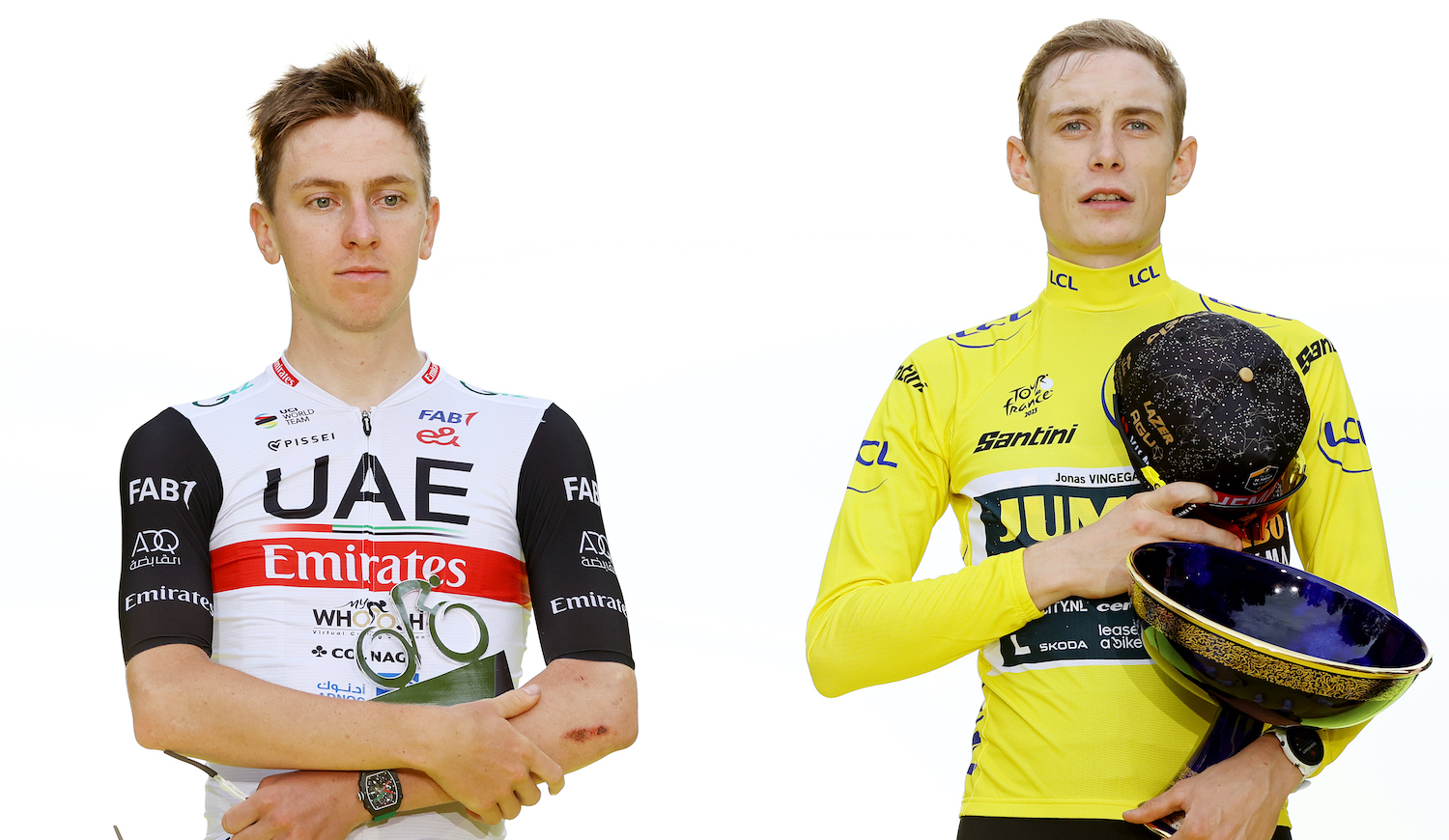When Tadej Pogacar crossed Stage 20's finish line, ending the final competitive portion of the 2023 Tour de France and sealing his second consecutive runner-up finish, he nearly lost his balance celebrating. Once, twice, three times he pumped his fists after simultaneously winning the five-up sprint and losing the Tour de France. Jonas Vingegaard would roll into Paris one day later the victor, sporting a gaudy margin of victory, yet something about Pogacar's defiance up on the Col du Platzerwasel was striking. Defeated or not, the point was clear: Pogacar will never stop caring or fighting, and the rivalry that's animated the past three Tours de France has not been settled for good.
It's remarkable, given how tightly contested the first two weeks of racing were, that Vingegaard wound up essentially tripling his winning margin from last year's Tour. His stunning time trial was the best ride in the whole race, though he truly put Pogacar to the sword one day later on the Col de la Loze when Pogacar broke and Vingegaard gapped him by five minutes. Vingegaard didn't even have to attack or anything, his teammate Sepp Kuss simply set a tempo Pogacar couldn't follow. "I'm gone," the Slovene said into his radio. "I'm dead." Vingegaard didn't win the stage, though he kissed his wedding ring in celebration after crossing the line, knowing his yellow jersey was secure.
🎙 Team radio zapping - stage 17
— Tour de France™ (@LeTour) July 19, 2023
🎧 The moment Tadej Pogacar said he was "dead and gone", the elation from @AG2RCITROENTEAM... Enjoy today's zapping.
🎧 L'instant où Tadej Pogacar s'est avoué vaincu, l'allégresse dans la voiture @AG2RCITROENTEAM, c'est maintenant !#TDF2023 pic.twitter.com/E0v6x0C7k3
If Vingegaard's first Tour was thrilling for its surprise—the unexpected beheading of the presumptive heir to the Tour by a gawky ex-fishmonger who started out as his own team's backup plan—his second showed how thrilling a dominant performance could be. Pogacar spent the race's entire stay in the Pyrenees and Massif Central haranguing Vingegaard without pause, gapping him for a few seconds here, a few seconds there, yet never truly cracking him. Pogacar's race ended when he couldn't hang on any longer, though all the time the two superstars spent trying to destroy each other created space for the race's supporting characters to shine. Carlos Rodriguez was able to slip out of the chaos atop the Joux Plane to win a stage; young Felix Gall went nuts on Stage 17; and Pello Bilbao, Matej Mohoric, and Wout Poels all took moving stage wins for their fallen teammate Gino Mäder. The racing was fantastic all the way through the final day, when Pogacar put in an obviously futile and hilariously braggadocious attack on the Champs-Elysees. Nobody does that expecting to win, but it was a statement of intent.
One can start to worry, given how boring the Team Sky era was, that Vingegaard is becoming untouchable, threatening to turn the Tour back into a boring annual race for second place behind the best rider on the best team. Vingegaard is only 26. Are we really about to be in for six or seven more of these? There are two reasons not to worry, one inescapably apparent at the Tour, another looming just off stage. The first is that Tadej Pogacar, someone who clearly wants to race, was not at his best in France in July after breaking his wrist in Belgium in April.
Pogacar is always so open with the press, and part of why he's earned fans' hearts in a way Vingegaard hasn't is that he gets in front of a camera and laughs as he says stuff like, "I'm fucked, I'm dead." So it's worth taking seriously his contention that his prep was seriously derailed by the injury. He told reporters that Vingegaard only really got the better of him on the Marie Blanque, and that his explosion on the Col de la Loze was essentially his body paying off its debts. "After that I just cracked myself alone," he said. "Nobody cracked me; it was all on me, nobody did anything to me. It was me and my bad feeling. I cracked myself." Maybe he's right, we've never seen his legs fail him like that, and it is still remarkable that despite his collapse, nobody but his teammate Adam Yates finished within five minutes of him. It also doesn't really matter. He cracked, and what's more, he lost to Vingegaard last year. Still, after Pogacar's dominant spring, it's hard to believe we didn't see the best version of him at the Tour.
He'll have company next time around, when cycling's crown prince makes his Tour debut and joins the group of contenders eager to take a swing at the Danish champion. Belgium's Remco Evenepoel has become a fan favorite for obvious reasons. The diminutive climber is all aggression, all the time. He got into a public spat with the rest of team Belgium at the 2021 World Championships as the team melted down, tactically outmatched, vulnerable to opportunistic riding, and bereft after failing to put a rider on the podium while hosting Worlds. Eddy Merckx, the greatest rider of all time, heavily criticized Evenepoel, saying, "If there is only one leader, you really shouldn't take Evenepoel. He rides mainly for himself." His teammates also called him out for being a baby after he skipped the post-race debrief.
Evenepoel really did race that one for himself, inadvertently costing co-leader Wout Van Aert a podium chance but also showing his own strength in the process. Despite the row, Evenepoel and Van Aert again came into the Worlds as co-leaders one year later, and Evenepoel left no doubt, winning the race by two minutes with a stunning solo attack.
That came on the heels of his wins at Liege-Bastogne-Liege and the Clasica de San Sebastian, and also the 2022 Vuelta a España. Evenepoel became the first Belgian Grand Tour winner since Johan De Muynck won the 1978 Giro, beating a strong field by two minutes and cementing his status as one of the best climbers in the world. This season, he repeated at Liege (in the race Pogacar broke his wrist, denying us a chance of a long-awaited showdown) and won two stages of a Giro he was probably also going to win, only to be forced out with COVID. Evenepoel's impressive record at each of the three Grand Tours he's contested shows that his aggressive style can work at the highest levels, and he's been thought of as a legit Tour de France contender for two years now.
The question is only which team will make him their leader. Evenepoel's status as the leader of the Belgian juggernauts over at Quick-Step is unchallenged, though as Vingegaard and Pogacar just showed, you can't compete for a yellow jersey without a bulletproof team. Quick-Step are one of the strongest classics teams around, though their cupboard isn't exactly stocked with a bunch of great climbers to support a Tour challenge. Though he's still on a long-term contract, the Tour was consumed by rumors that Ineos-Grenadiers and Israel-Premier Tech were both maneuvering to make huge offers for a transfer. Either one would give him a better shot at winning and cement his scoundrel arc in the process, though no matter who he's racing for in 2024, he'll be in France to win.
Does he really have the legs to challenge the big two? There's no reason not to think so now, or to root against such an outcome. After all, if Pogacar and Vingegaard's rivalry is so good, just imagine what throwing in a villain will do for it.






